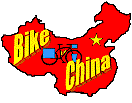China Cycling Travelogues
Do you have a China cycling travelogue you would like
to share here?
Contact us for details.
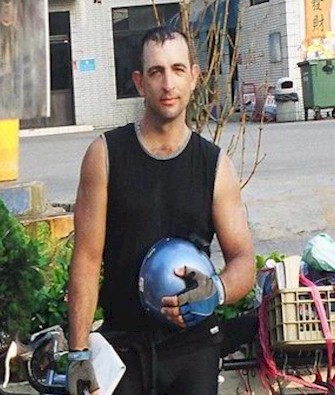
Around Formosa by Bicycle
September 2003
Page 1
Copyright © Antonio Graceffo, 2003.
All Photos by Antonio Graceffo
Skip to: Antonio Graceffo - Page 1 | Antonio Graceffo - Page 2 | Antonio Graceffo - Page 3
I just completed a solo trek, of well over 1,300 km, by bicycle, around the Island of Formosa. Along the way, I stopped to get to know the local people. I spent nights in churches, temples, police stations, and even spent a night with the aborigines, learning much about their culture.
My goal was to portray Taiwan as a travel destination, but also to dispel myths of the entire island being an industrial manufacturing plant. I was able to capture beautiful photographs of sunsets above lush, green tropical forests in Taiwan’s mountains, matched only by the beauty of the golden sunrises, on the Pacific Ocean.
The trip was grueling, interesting, funny, and entertaining.
Around Formosa by Bicycle
09/07/2003
Sunday
I left Kaohsiung at about 7:30 AM. The first forty-five minutes I inhaled exhaust fumes from motorcycles and was nearly asphyxiated by the gases coming out of the various factories on the south end of town. But once I got clear of the sprawling metropolis, the ride improved.
Following Rt. 17 South, down the coast was beautiful. A couple of hours into the trip I turned off the highway, into a small village, jutting out into the ocean, like a private peninsula. Children and dogs chased after me, like the Pied Piper, and I couldn’t help but feel jealous of them. They had all of the private beach space they could ever need. What’s more, they could run and play in the streets all day, safe from traffic, and under the watchful eye of neighbors who all, undoubtedly, knew, and watched out for each other.
Everyone came out to stare at the stranger from another world. I can’t say I blame them, however. I did look pretty strange. Instead of my usual expedition clothing, I was wearing bicycle togs, complete with helmet. If not for the shorts, they might have confused me with a Mormon missionary. My bike also looked extremely strange. It was a Taiwanese made copy of a European racing bike, complete with toe-clips, 21 speeds, indexed shifting, thin racing tires, aerodynamic rims, and flat tubing. The original bike probably cost about $1,000 US. But my Taiwanese copy cost $3,000 NT (about $100 US). I like to call my style of expedition "adventure on the cheap."
The strangest aspect of my bike was that I couldn’t find any place to buy panniers, or cycling bags. So, all of my gear was sitting inside of a large, plastic tub, mounted on the back. It was possible that people thought I was delivering milk or selling ice cream. The tub worked out fairly well, since it was virtually waterproof, and would probably help me stay afloat if I went off a bridge into the ocean. The down side was that it sat up too high, and gave the bike zero stability. Every time a car or truck went by, I almost fell over. It also acted like a sail, and caught all of the wind ahead of me, reducing my speed. As it turned out, however, this feature would later save my life on the mountain descents.
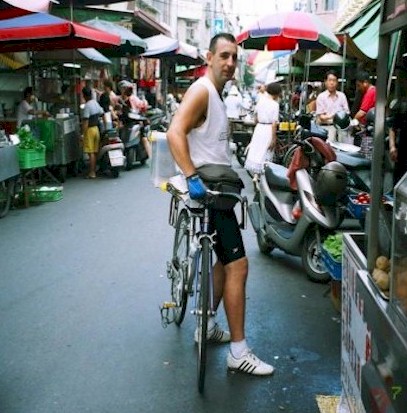
Walking my bike across a parking lot, I was trying to decide if the beetlenut girl across the street were wearing underwear or not. I heard the voice of my old paisano, Marco Polo, telling me not to look. But I couldn’t help it. She was there, her skirt was exceedingly short, and her dress was see-through. When I was in the Takalamakan Desert Polo had told me not to be lured off the path by visions of a lake glistening somewhere in the distance. I heeded his words, that time, and I survived. But this time, I told Marco to go take a hike, so I solved the panties mystery. While I was so distracted, and so engaged, the bike flipped over. My plastic tub came flying off, and my gear, underwear and all, spilled out all over McDonald’s parking lot. I only barely managed to re-attach it, and realized that I definitely needed to find a better way to carry my gear.
I was planning to spend my first night out on the beach at Kenting, but it started raining, so I crawled under the beach administrator station, where it was dry. The police kept a watchful eye, to make sure no one camped on the beach, and I dosed happily below. Around 2:00 a.m. a police dog crawled under the house, mistakenly believing he was going to sleep there. I let him know, in no uncertain terms, that I was prepared to fight him for the space. Luckily, he just licked my hand, and settled down next to me. While I slept, he did what so many lovers had done in the past. He chewed up one of my socks, and left before I woke.
The second day was awful! No one told me there were mountains in Taiwan. Actually, I think someone told me, but I was watching Simpsons at the time, so I just said something like "yeah, yeah, mountains..." and forgot the whole incident. The mountains at the south of the island were terrible. They just kept going up and up. But the views were incredible. One minute I was in the tropical heat of the beach. The next minute, I was on a wooded trail, shaded on both sides, climbing into the sky. At one point, the ocean was visible on both sides.
It took six hours to cut across. I rolled off the mountains, and into a small town, called Da Wu, around 5:00 PM. The East Coast is nothing but empty, undeveloped beaches, where you could stop and swim; completely free of the hassles associated with dealing with tourists and tourist resorts. Prices were also noticeably cheaper on the East Coast.
As dark approached, I stopped at a restaurant with a wooden picnic pavilion, with an ocean view. After dinner, I lay under the pavilion, and let the sound of the surf lull me to sleep.
The third day was the best day of riding. It was completely flat, and never left the coast. A few miles outside of Taidong my cell phone rang. It was a friend calling to see if I was OK, and where I was. I had to laugh. We go on adventures to get away from cell phones and computers. But then we go to great lengths to take them with us. The strange thing about adventure in Taiwan is that your cell phone will work anywhere on the island. In fact, I was on an adventure, but no one else knew that. While I was sleeping under the administration hut at Kenting, there were people, two hundred meters away, paying $2,500 NT a night for a hotel room. Giving in to technology, I rode into town, and checked my email.
I was about thirty kilometers north of Taidong when I spied a statue of the Blessed Mother on the road up ahead. At first I thought it was another one of those hallucinations, like the beetle nut girl, but Marco told me it was real. I turned up the hill by the Virgin Mary statue, and at the top, there was a Catholic Church. There was a shrine out front, with the Holly Mother, surrounded by incense, just like in a Buddhist shrine. I had read, in that famous book about Taiwan, "Keeping up With the War Gods," that the Catholic church in Taiwan had gone to great lengths to accommodate local culture, and incorporate it into the religion, to make it more palatable to converts. I knelt at the alter to give thanks for my safe arrival, but the smell of the incense, and the shape and configuration of the kneelers made me feel like I was at a Buddhist worship service, back in the Shaolin Temple, when I had studied there. I began doing prostrations, in spite of myself. I don’t think God was offended, though. It was all a sign of respect.
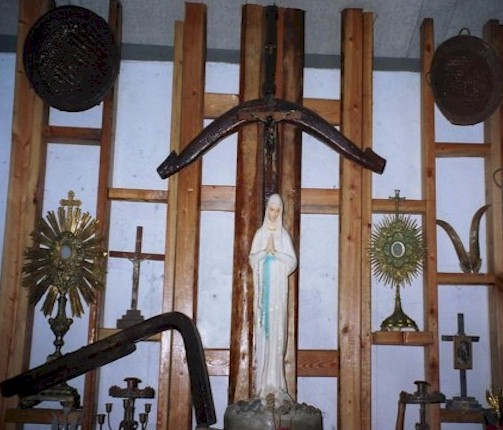
I poked around the church, looking for the priest, and noticed a number of signs and prayers written in Latin script, but in a language completely foreign to me. For a moment, I thought that I had stumbled on a Philippine Catholic Church. An ancient woman, smoking a cigar and chewing beetle nuts, came out to greet me.
"I’m looking for the priest." I said, in Mandarin.
She led me to heavyset man, working in the garden with a number of dark skinned converts. Now, until this moment, I had attributed the dark skin of the people on the East Coast to the fact that they were out in the sun all day. What’s more, I had decided that the strange language they spoke among themselves was Taiwanese. The woman spoke to me in Mandarin, but to the priest in another language. Then the priest spoke to me in Mandarin, saying that I could stay the night. That’s when I finally figured out what was going on. I was in an aboriginal Catholic Church. It turned out that the priest, Father Steven, and all of his flock were Amei Zu ren (Amei tribe) aboriginals. It then occurred to me that everyone I had met, who spoke this strange language, was aboriginal. Father Steven told me the majority of the population on the East Side is aboriginals. Oddly, all of them, with the exception of the very, very old, spoke perfect Mandarin when they spoke to me.
Father Steven led me through the church compound, which centered on a traditional aboriginal log house. I was given my own room, with a shower and a fan. "This is a good room." Said Father Steven. "The old priest lived in here for thirty three years."
"Why did he give it up?" I asked.
"He died, in that bed," said Father Steven, pointing.
"Great!"
After I had showered I sat with Father Steven and the Amei Zu people. They lived a communal existence, all living and working together on the church grounds. "I have been living here since I was three years old." Father Steven told me.
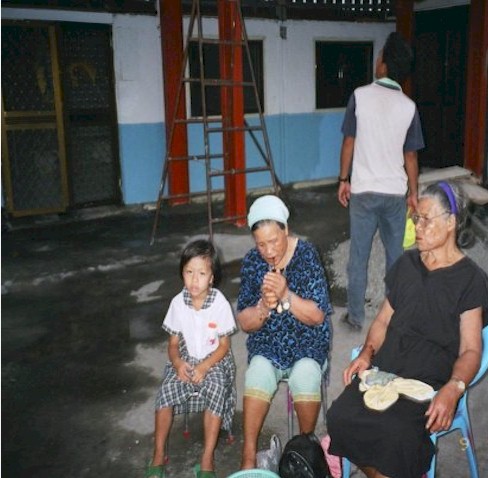
We ate together, out doors, at a large table. Afterwards, the old people told stories, the women smoked cigars, and everyone chewed beetle nuts. Periodically one of them walked around with a pitcher full of fruit flavored firewater, and we all drank from the same cup.
"All the young people go away." Father Steven told me sadly. "There are no jobs here. They all leave for the city, to go to school, or to work. Then they get married, and they never come back. You see that house?" He asked, pointing. "It is empty. Also that one, that one that one. Nine empty houses right here by the church."
There was a young Amei Zu boy, who was attending high school. "Do you speak Amei Zu language at school?" I asked.
"No, all of the teachers are Han Zu (ethnic Chinese). They make us speak Mandarin." He answered.
"The young people don’t speak the language anymore." Said Father Steven. "We write it, with Latin letters, in church. But that’s it. Now, there are so few people here the children have to travel thirty kilometers to go to school. They learn Mandarin, and they forget who they are. Before, this yard was full, fifty, sixty people. We would all eat, and sit together all night. But now, one wants to watch TV. The other one wants to play computer. It is all ending."
I could have stayed a thousand years with Father Steven and his family. But I was traveling.
The next morning I pushed into the mountains again, approaching Hualien. At some points, the going was so tough I thought I would die. It took me all day just to do 90 Kilometers. I saw a sign that said "Hualien 30 KM." Three hours later, I saw another sign that said "Hualien 30 Km." I suspect I may have taken a wrong turn. It was disheartening. I wanted to pull to the side of the road and rest in the shade, but there was none. When I finally saw a spot carved out of the jungle, big enough for my body, I collapsed, and was out for about twenty minutes. When I came to, I decided that if things didn’t improve soon, I would give up. That’s when it started raining.
When I finally made it to Hualien for real, I luckily stumbled onto a Catholic Church. The Sisters were very sweet, and offered me a place to stay. I was only going to stay the night, but I decided to stay two nights and get some rest. At a 7/11 I met an American cyclist, named Eric, who I told about my journey. "That stretch in the mountains really did me in." I said.
"Mountains?" He asked. "There are no mountains south of here. There are a few hills, maybe. But all of the mountains are north. You’ll see them tomorrow. 80 kilometers straight up." He followed this with. "That’s my favorite part of cycling in Taiwan. Where else can you get 80 km straight up?"
"Yeah, that’s my favorite part too." I lied. If I wasn’t so tired I would have thrown a Shaolin kick at his kneecap, and asked him how he liked cycling now.
I’ve lived in a Buddhist monastery for a period of months, and no offense to my Buddhist, Kung Fu brothers, but Catholics live much better than Buddhists. The sisters put me up in a private room, with a bath. I had a ceiling fan, and there was cable in the TV room. And, everything was spotless. It really beat the outhouse, and weeks without a shower that I had living in a Buddhist monastery. I think I may write a hotel guidebook, rating the accommodations at various religions and houses of worship.
09/12
On the night of the Moon Festival, the Catholic Sisters invited me to their barbecue. All I had done the whole day, was sleep, eat, drink fluids, and sleep again. I had only just woken up when the fireworks started. The Sisters forced perfectly grilled meat down my throat until I heard my arteries clog. My left ventricle actually made a sound like firing a gun, as it slammed shut. I was thinking, after eating all that fat in one sitting, maybe I should take up a diet and exercise program. Maybe I should start bike riding. Ah, but I would never stick with it. I’d probably buy a bike, and it would wind up rusting out in the garage, unused.
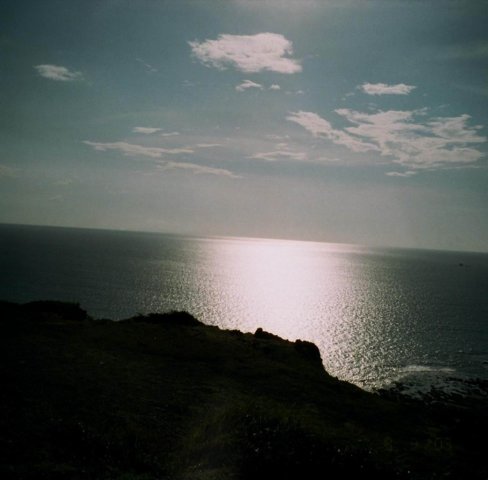
The mountains from Hualien to Suao were absolutely dreadful. I really thought I was going to die of exertion. The one good thing about the high mountains was that they gave my saddle sores a chance to heel, as I had to push the bike most of the way. I wondered why you never saw guys pushing their bikes in the Tour De France. But now I had blisters on my feet, as well as my bottom. You just couldn’t win. I would push my bike, straining every muscle, like the Grinch, when he was trying to keep the sled full of Christmas presents from falling off the cliff. Every step of the way, I recited poetry to keep myself going. I would take one step and say "Half a league." Then another step. "Half a league." Another step. "Half a league onward." It worked pretty well, but then I remembered the next line was "Into the Valley of Death."
Valley of Death?
I didn’t want to go into the Valley of Death. In fact, if there were one place I wanted to avoid, it would be the Valley of Death. My travel agent said "Scenic mountain roads, and ocean views." There was no mention of Valley of Death. I would have remembered Valley of Death.
The other problem was the traffic. I had purposely left the Sisters at about 5:00 AM, to get as much of the mountain passes done, as early as possible, before the cars and trucks began coming en masse.
There were parts of the road where the shoulder was literally a few inches wide, and where trucks and busses passed within centimeters of my body. At those times I was wishing I had lost more weight, so I would be a smaller target. I think that some of the mountains may have been beautiful, but I didn’t bother to look. I was too worried about having a second coronary, or being hit by a truck. I did take one horrifying picture of the inside of a tunnel. The way from Hualien was pocked by tunnels; some of them so narrow, that there were only one and a half lanes open for traffic. They all had warning signs, reading, "No Bicycles." I took this to mean that they didn’t have any bicycles, but that they wanted one, so I went ahead and rode in the tunnels anyway. After all, what could happen inside a tunnel?
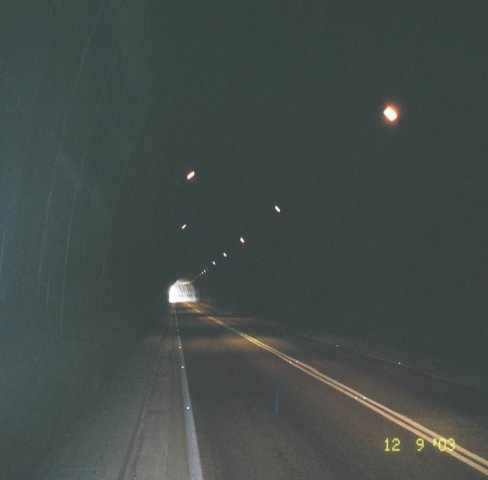
The tunnels reminded me of the Mines of Moria from JRR Tolkien. They were dark, scary places, often a kilometer long, where every car, coming from either direction was a potential threat. Having no other recourse, I fell back on the advice the nuns had given me when I was a kid, in Catholic school. "If the bullies bother you, just ignore them, and they will go away." I stared down at the ground chanting. "There are no cars. There are no cars. There are no cars." But then one of them would almost brush against me, and I would have to admit that they did in fact exist.
As I mentioned before, I am not carrying my gear in panniers, rather in one of those plastic tubs that well organized single mothers use for their children’s toys. I like to refer to mine as the pickle tub, and my bike, as the Pickle Tub Express. Unfortunately, as I also mentioned, the pickle tub makes my bike very top heavy. I often had to wrestle with it, like Kenny Shamrock, using my considerable upper body strength, to keep it from flipping over. And, as I was tired, it did flip over periodically. Each time it hit the deck, the pickle tub broke a little bit.
While I was riding on one of those narrow passes, my bike suddenly veered right, and I crashed into the guardrail. I was unhurt. Luckily my very expensive camera absorbed most of the impact. But the bike then flipped again, this time, for the last time. The pickle tub shattered when it hit the ground. And once again, strangers could see my underwear. Had a group of cruel school children been standing around, they would have begun chanting. "I see London, I see France, I see Antonio’s underpants."
My first instinct was to bend over, and start picking things up, but a car blew on his horn, reminding me that I was holding up a line of twenty vehicles, on a busy mountain pass. Gingerly, I plastered my body to the wall, crouched down, and carefully gathered my things. I tied them, to my bike, temporarily, and made it to a rest stop, luckily, only two hundred meters away.
What now? I wondered. There was a gaping hole in the bottom of my pickle tub. I considered taking my film, diary, and autographed picture of Jimmy Buffet, and leaving everything else for the aborigines. But just then, as a weird stroke of luck, I noticed a plastic egg crate sitting behind a drink stand. It wasn’t just any crate, it was THE crate! It didn’t have a lid, but it was one of those crates that already had holes in it. The lady at the drink stand gave it to me, and soon I had it tied on my bike. It was infinitely more stable than my pickle tub, and had a lower center of gravity. I wrapped up all my belongings in my blanket, and tied them to the crate. Everything fit, except my tent. No worries, I gave it to the aborigine woman selling milk tea. Eventually, I think I won’t even miss my pickle crate.
The rest stop, the egg crate...it was all a lot of good luck. Almost too good to believe. Like Samuel L Jackson, in Pulp Fiction, I believe it was divine intervention. Perhaps this was a sign that I should change my ways, and live my life wandering the Earth.
My body is doing much better after my long rest, yesterday. I guess that’s why people train and stuff. My arms, however, are so sunburned that they look like perfectly scorched fried chicken. They bubbled up; the bubbles popped, and then new bubbles formed on the pink skin below. I look like the victim of a biological warfare agent. Now, in addition to being filthy and smelling badly, I have skin dripping off of me like the Swamp Think. It peels off in huge shreds, like Gold Member, in the Austin Powers movies.
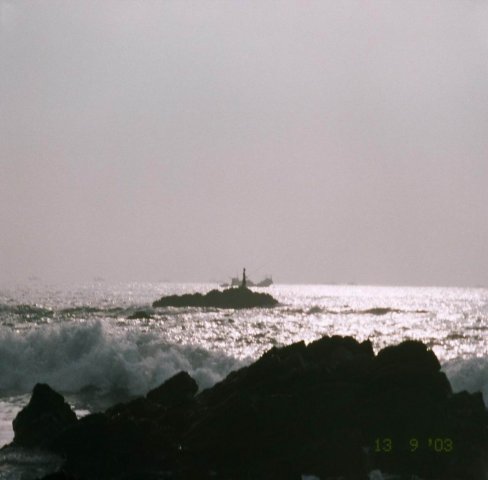
Skip to: Antonio Graceffo - Page 1 | Antonio Graceffo - Page 2 | Antonio Graceffo - Page 3
Bike China Adventures, Inc.
Home | Guided Bike Tours | Testimonials |
| Photos | Bicycle Travelogues
| Products | Info |
Contact Us
Copyright © Bike China Adventures, Inc., 1998-2012. All rights reserved.

